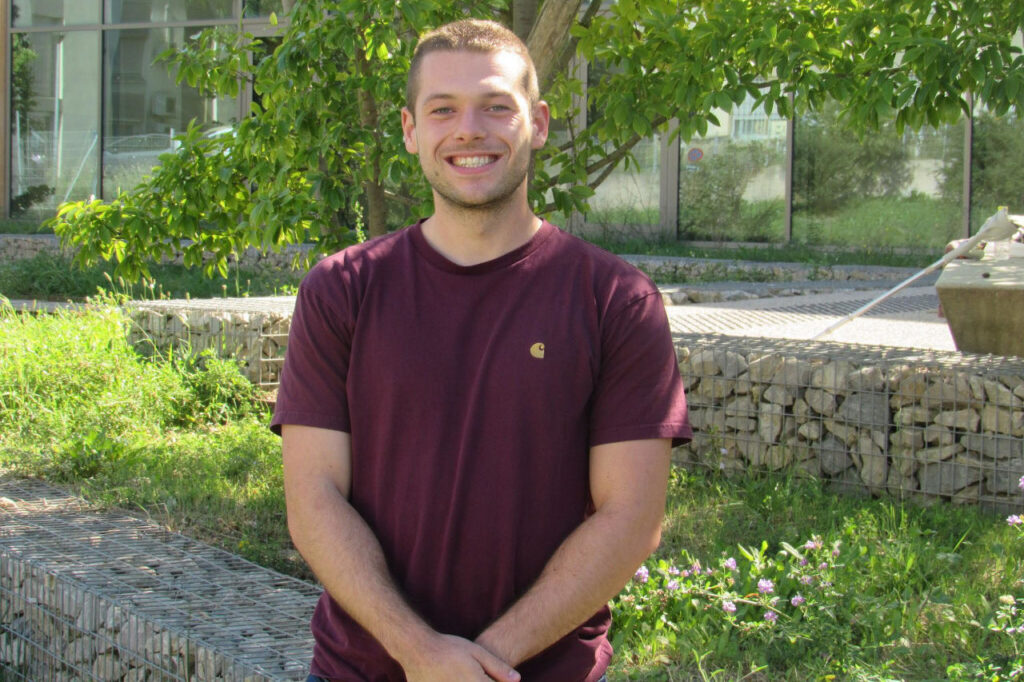PhD Innovation Week: testing your capacity for innovation
In early December 2024, doctoral student Logan Chevret took part in PhD Innovation Week. A sort of real-world exercise, he gained valuable technical advice and practical experience, with the ultimate goal of developing his own business.

If he had any doubts, he is now even more convinced: after completing his studies, Logan Chevret would like to try his hand at entrepreneurship. "I've always been attracted to the practical side of chemistry research, " says the doctoral student, who participated in the very first edition of PhD Innovation Week, held December 2-5, 2024, organized by the University of Montpellier, leader of the University Innovation Cluster, the doctoral college, and the Technology Transfer Acceleration Company ( SATT AxLR) of Montpellier. With a group of volunteer students, he explored the potential of innovative research and tested its possible transfer to the market. Inspired by the "Doctoriales," this full-scale exercise is ultimately intended to raise awareness among students nearing the end of their studies about starting a business.
Currently working on his CIFRE thesis, which bridges the academic and industrial worlds, the young man is spending his final year of study at theCharles Gerhardt Institute in Montpellier (ICGM) and at the Saint-Gobain research center in Paris. Every day, he strives to find solutions to "reduce the company's carbon footprint." This is a major industrial need, which he is attempting to address in two ways: by successfully recycling the resins already on the market, but also by replacing them in the long term with new, easily recyclable, low-carbon-impact resins.
A true revelation
The doctoral student is expected to complete his thesis, which he began three years ago, by this fall. After that, he plans to eventually start his own business. "I've always enjoyed working on concrete projects. You have an idea, and gradually you test its industrial applications, potentially right up to the factory stage. We have the opportunity to support the project at every stage, from design to implementation, " summarizes Logan Chevret.
For people like him, PhD Innovation Week was a real eye-opener. During that week, around 30 doctoral researchers various backgrounds gathered at the Boutonnet campus of the University of Montpellier "with a shared desire to explore the world of business, " explains Logan. Numerous experts were on hand to help them and explain the key steps involved. "For example, we learned how to pitch a product and initiate a fundraising campaign."
Testing the viability of a project from start to finish
Divided into several groups, the students then put themselves in the shoes of a researcher about to create their own start-up based on a patent. "We were assigned an active but unexploited patent that SATT AxLR had not yet commercialized. These were patents that had not yet led to the creation of a start-up or a product. The goal was therefore to come up with a way to exploit this asset and promote it," continues Logan Chevret, who worked specifically on the Tumor Cell asset.
Filed 17 years ago, this patent aims to detect cancerous tumors early on using a blood test. "We chose this patent because we were interested in its potential," adds the doctoral student, who then took part in the presentation at the end of the week. "The idea was to detail all the stages of our project, from its implementation to the creation of a company. We wondered whether we should develop other patents in parallel. But also whether it would be more sensible to develop an analysis laboratory to process our samples ourselves, or whether we should work in collaboration with hospitals. We also looked into the possibility of funding from Social Security. And then we tried to quantify the cost of each stage..."
Alongside Satt-AxLr, incubators Initium, Bic Montpellier, Bic Innov'up Nîmes, and Pepite-LR were also in attendance. This was an opportunity for Logan to make some contacts with a view to refining his future projects. “It was reassuring, as it allowed us to see what support was available to us,” adds the student, who would like to continue working in the environmental sector. “I feel like I’m making a difference. It’s a promising and necessary field…” This new initiative, co-sponsored by the University of Montpellier, promises to inspire even more people to become entrepreneurs!